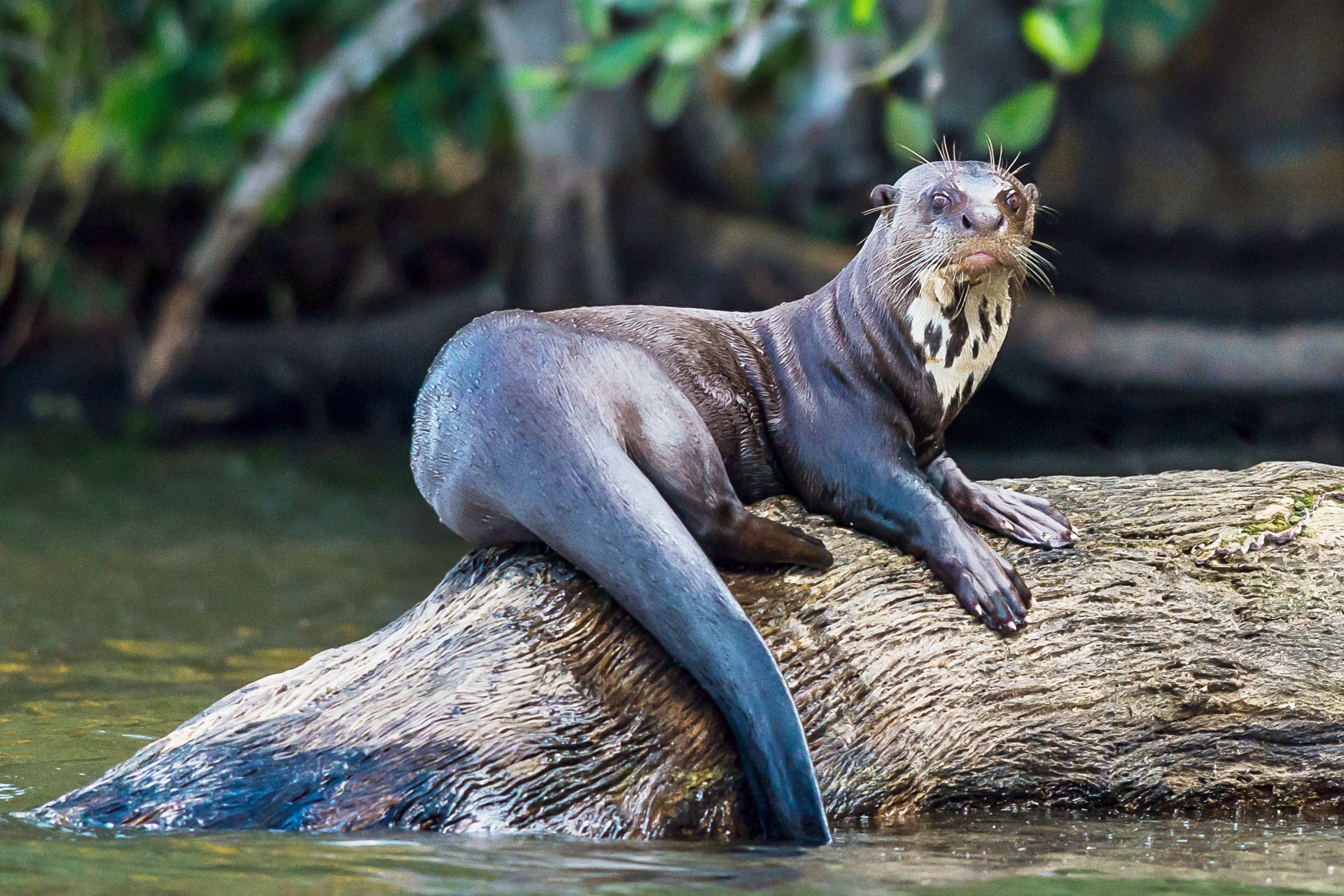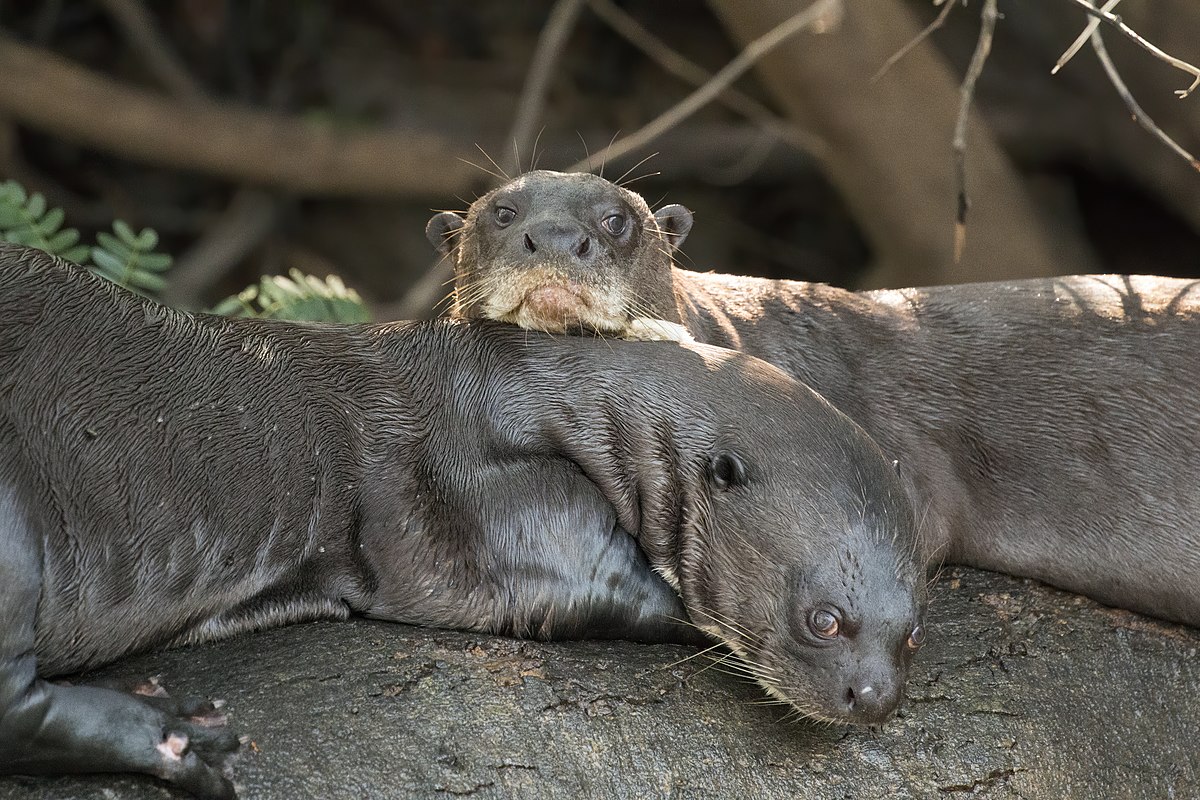Introduction
Otters Thrive in the Sundarban: The Sundarban Delta, situated in the Bay of Bengal, is an exceptional ecosystem renowned for its diverse range of flora and fauna and distinctive mangrove forests. The location harbours diverse fauna, comprising the renowned Bengal tiger, crocodiles, and a plethora of avian species. Nonetheless, the giant river otter is a species that is infrequently linked to the Sundarbans. This blog post aims to assess the viability of introducing a limited population of 10 giant river otters to the Sundarban Delta. Additionally, it will analyse the possible obstacles and advantages that may arise from this undertaking.
Understanding Giant River Otters
The Pteronura brasiliensis, commonly known as the Giant River Otter, holds the distinction of being the largest otter species globally, with a length of up to 1.8 metres (6 feet). These animals exhibit a strong social behaviour and typically reside in familial units consisting of approximately 10 individuals. The otters in question are predominantly located in freshwater environments, including rivers, lakes, and wetlands. Their survival is contingent upon access to unpolluted water sources and plentiful fish populations. Let’s check some more informetion about Otters Thrive in the Sundarban.
Know More about Sundarban:
The Sundarban Delta and its Challenges
The Sundarban Delta, which extends across India and Bangladesh, is a distinctive and intricate ecosystem distinguished by its expansive mangrove forests, tidal rivers, and extensive estuarine network. This location has been designated as a UNESCO World Heritage Site and serves as a habitat for the Bengal tiger, an endangered species that flourishes in this intricate ecosystem. Nonetheless, the introduction of giant river otters to the Sundarbans poses various challenges. Let’s know some more informetion about Otters Thrive in the Sundarban.
Adaptation to Saltwater:
The giant river otters exhibit adaptations that are specific to freshwater environments, and may encounter challenges in adapting to the brackish and saline conditions that are commonly found in the Sundarbans. The unique adaptations of the species for thriving in freshwater habitats, including their dentition and thick fur, may not be well-suited for the salinity levels prevalent in the Delta.
Competition for Resources:
The introduction of a new predator in the Sundarbans could potentially disrupt the delicate balance of various species that currently exist within the ecosystem. The primary diet of giant river otters consists of fish. Their presence may potentially lead to heightened competition with other species that also consume fish, including local fishing communities.

Habitat Suitability:
The Sundarbans region presents a vast network of waterways. However, it is imperative to conduct a thorough assessment of the specific needs of giant river otters, including but not limited to access to unpolluted water and ample fish populations. The establishment of viable den sites and the procurement of adequate prey may pose as limiting factors within this delta ecosystem.
Benefits of Introducing Giant River Otters
Despite the challenges, potential benefits should be taken into consideration when contemplating the introduction of giant river otters to the Sundarban Delta.

Ecotourism and Conservation:
The giant river otter is a charismatic species that has the potential to serve as a flagship species, drawing ecotourism interest. The presence of these entities has the potential to generate revenue that can be utilised for conservation initiatives and community development. This economic incentive could potentially motivate local communities to assume responsibility as stewards of the otters and their habitat.
Biodiversity Conservation:
The Sundarbans are renowned for their diverse range of flora and fauna. The potential inclusion of giant river otters could potentially enhance the region’s overall ecological diversity. The reintroduction of a top predator may result in cascading effects within the ecosystem, ultimately leading to a more balanced and resilient system.

Research and Education:
The existence of large river otters in the Sundarbans region presents a valuable prospect for scientific inquiry and educational endeavours. Examining the behaviour, adaptations, and interrelationships of species within the delta ecosystem has the potential to augment our comprehension of this environment and provide valuable insights for future conservation initiatives.
Conclusion
The proposal to introduce giant river otters to the Sundarban Delta warrants careful consideration of the potential challenges and impacts that may arise, given the delicate nature of the ecosystem. Prior to initiating any reintroduction initiatives, it is imperative to conduct comprehensive research, seek input from subject matter experts, and conduct impact assessments to assess feasibility and potential ramifications.

In the grand scheme of things, prioritizing the preservation of current species and their respective habitats is of utmost importance. The primary objective should be to prioritize the preservation and restoration of the distinctive ecosystems in the Sundarban Delta, while simultaneously ensuring the sustainable livelihoods of the local communities. By striking a careful balance between conservation efforts and human activities, we can ensure the preservation and appreciation of the remarkable natural heritage of the Sundarbans for generations to come.
Do you want to Visit Sundarban and watch otters.
We have Sundarban Tour Packages every day
For Booking Of Best Sundarban Package( Starting from 2799/-)
Name: Dilip MAity
Organization: Royal Sundarban Tourism
Organizations Web link: https://royalsundarbantourism.com/
Contact: +917439965413 / 8584838109
Gpay / Phone pay : 9804049535
Email: info@royalsundarbantourism.com
Address: Tiger More, Gosaba, Pakhiralay, Pakhiralay Main road, District- 24 Parganas South, West Bengal 743370 Also you can Book Sundarban Tour At Maity Tourism Powered By Argusdna,
